Progressive education is a pedagogical movement that began in the late nineteenth century and has persisted in various forms to the present. In Europe, progressive education took the form of the New Education Movement. The term progressive was engaged to distinguish this education from the traditional curricula of the 19th century, which was rooted in classical preparation for the university and strongly differentiated by social class. By contrast, progressive education finds its roots in modern experience. Most progressive education programs have these qualities in common:

Educational psychology is the branch of psychology concerned with the scientific study of human learning. The study of learning processes, from both cognitive and behavioral perspectives, allows researchers to understand individual differences in intelligence, cognitive development, affect, motivation, self-regulation, and self-concept, as well as their role in learning. The field of educational psychology relies heavily on quantitative methods, including testing and measurement, to enhance educational activities related to instructional design, classroom management, and assessment, which serve to facilitate learning processes in various educational settings across the lifespan.
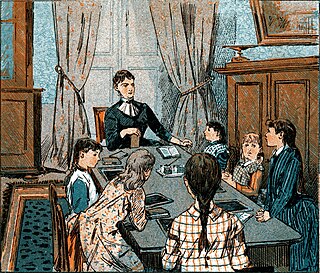
Homeschooling or home schooling, also known as home education or elective home education (EHE), is the education of school-aged children at home or a variety of places other than a school. Usually conducted by a parent, tutor, or an online teacher, many homeschool families use less formal, more personalized and individualized methods of learning that are not always found in schools. The actual practice of homeschooling can look very different. The spectrum ranges from highly structured forms based on traditional school lessons to more open, free forms such as unschooling, which is a lesson- and curriculum-free implementation of homeschooling. Some families who initially attended a school go through a deschool phase to break away from school habits and prepare for homeschooling. While "homeschooling" is the term commonly used in North America, "home education" is primarily used in Europe and many Commonwealth countries. Homeschooling should not be confused with distance education, which generally refers to the arrangement where the student is educated by and conforms to the requirements of an online school, rather than being educated independently and unrestrictedly by their parents or by themselves.
The philosophy of education examines the goals, forms, methods, and meaning of education. The term is used to describe both fundamental philosophical analysis of these themes and the description or analysis of particular pedagogical approaches. Considerations of how the profession relates to broader philosophical or sociocultural contexts may be included. The philosophy of education thus overlaps with the field of education and applied philosophy.
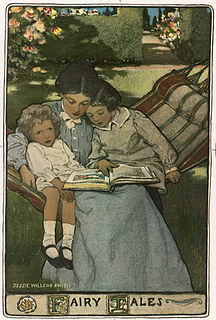
Children's literature or juvenile literature includes stories, books, magazines, and poems that are created for children. Modern children's literature is classified in two different ways: genre or the intended age of the reader.
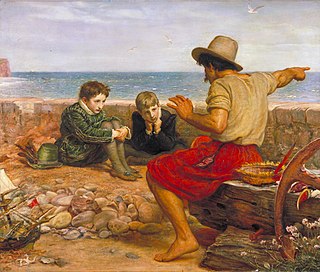
Storytelling is the social and cultural activity of sharing stories, sometimes with improvisation, theatrics or embellishment. Every culture has its own stories or narratives, which are shared as a means of entertainment, education, cultural preservation or instilling moral values. Crucial elements of stories and storytelling include plot, characters and narrative point of view. The term "storytelling" can refer specifically to oral storytelling but also broadly to techniques used in other media to unfold or disclose the narrative of a story.
A teaching method comprises the principles and methods used by teachers to enable student learning. These strategies are determined partly on subject matter to be taught and partly by the nature of the learner. For a particular teaching method to be appropriate and efficient it has to be in relation with the characteristic of the learner and the type of learning it is supposed to bring about. Suggestions are there to design and selection of teaching methods must take into account not only the nature of the subject matter but also how students learn. In today's school the trend is that it encourages much creativity. It is a known fact that human advancement comes through reasoning. This reasoning and original thought enhances creativity.
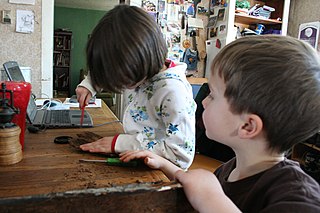
Unschooling is an informal learning that advocates learner-chosen activities as a primary means for learning. Unschoolers learn through their natural life experiences including play, household responsibilities, personal interests and curiosity, internships and work experience, travel, books, elective classes, family, mentors, and social interaction. Often considered a lesson- and curriculum-free implementation of homeschooling, unschooling encourages exploration of activities initiated by the children themselves, believing that the more personal learning is, the more meaningful, well-understood and therefore useful it is to the child. While courses may occasionally be taken, unschooling questions the usefulness of standard curricula, fixed times at which learning should take place, conventional grading methods in standardized tests, forced contact with children in their own age group, the compulsion to do homework, regardless of whether it helps the learner in their individual situation, the effectiveness of listening to and obeying the orders of one authority figure for several hours each day, and other features of traditional schooling in the education of each unique child.

The Montessori method of education is a system of education for children that seeks to develop natural interests and activities rather than use formal teaching methods. It was developed by physician Maria Montessori. It emphasizes independence and it views children as naturally eager for knowledge and capable of initiating learning in a sufficiently supportive and well-prepared learning environment. It discourages some conventional measures of achievement, such as grades and tests. Montessori developed her theories in the early twentieth century through scientific experimentation with her students; the method has since been used in many parts of the world, in public and private schools alike.

Readability is the ease with which a reader can understand a written text. In natural language, the readability of text depends on its content and its presentation. Researchers have used various factors to measure readability, such as:
Young adult fiction (YA) is a category of fiction written for readers from 12 to 18 years of age. While the genre is targeted at adolescents, approximately half of YA readers are adults.
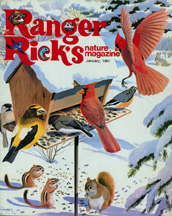
Ranger Rick, originally Ranger Rick's Nature Magazine, is a children's nature magazine that is published by the United States National Wildlife Federation. The magazine offers feature articles and activities for children, ages 7 and up, in order to spark their interest in the outdoors and encourage them to become more actively involved in protecting the environment. The magazine's primary intention is to instill a passion for nature and promote activity outdoors. NWF also publishes two companion magazines, Ranger Rick Jr., which is aimed at ages 4–7, and Ranger Rick Cub, which is aimed at kids 0–4 years old.
This glossary of education-related terms is based on how they commonly are used in Wikipedia articles. This article contains terms starting with A – C. Select a letter from the table of contents to find terms on other articles.
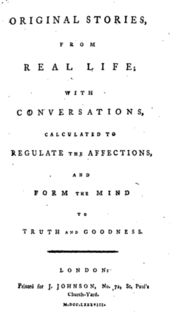
Original Stories from Real Life; with Conversations Calculated to Regulate the Affections, and Form the Mind to Truth and Goodness is the only complete work of children's literature by the 18th-century English feminist author Mary Wollstonecraft. Original Stories begins with a frame story that sketches out the education of two young girls by their maternal teacher Mrs. Mason, followed by a series of didactic tales. The book was first published by Joseph Johnson in 1788; a second, illustrated edition, with engravings by William Blake, was released in 1791 and remained in print for around a quarter of a century.

Reading is the process of taking in the sense or meaning of letters, symbols, etc., especially by sight or touch.
Environmental adult education is recognized as a "hybrid outgrowth of the environmental movement and adult education, combining an ecological orientation with a learning paradigm to provide a vigorous educational approach to environmental concerns."

Hermine Hug-Hellmuth was an Austrian psychoanalyst. She is regarded as the first psychoanalyst practicing with children and the first to conceptualize the technique of psychoanalysing children.
Child integration is the inclusion of children in a variety of mature daily activities of families and communities. This contrasts with, for example, age segregation; separating children into age-defined activities and institutions. Integrating children in the range of mature family and community activities gives equal value and responsibility to children as contributors and collaborators, and can be a way to help them learn. Children's integration provides a learning environment because children are able to observe and pitch in as they feel they can.

An interview in qualitative research is a conversation where questions are asked to elicit information. The interviewer is usually a professional or paid researcher, sometimes trained, who poses questions to the interviewee, in an alternating series of usually brief questions and answers. They can be contrasted with focus groups in which an interviewer questions a group of people and observes the resulting conversation between interviewees, or surveys which are more anonymous and limit respondents to a range of predetermined answer choices. In addition, there are special considerations when interviewing children. In phenomenological or ethnographic research, interviews are used to uncover the meanings of central themes in the life world of the subjects from their own point of view.
Theatre in education (TIE) originated in Britain in 1965 and has continued to present day. Monica Prendergast and Juliana Saxton cited TIE as "one of the two historic roots of applied theatre practice". TIE typically includes a theatre company performing in an educational setting for youth, including interactive and performative moments.










